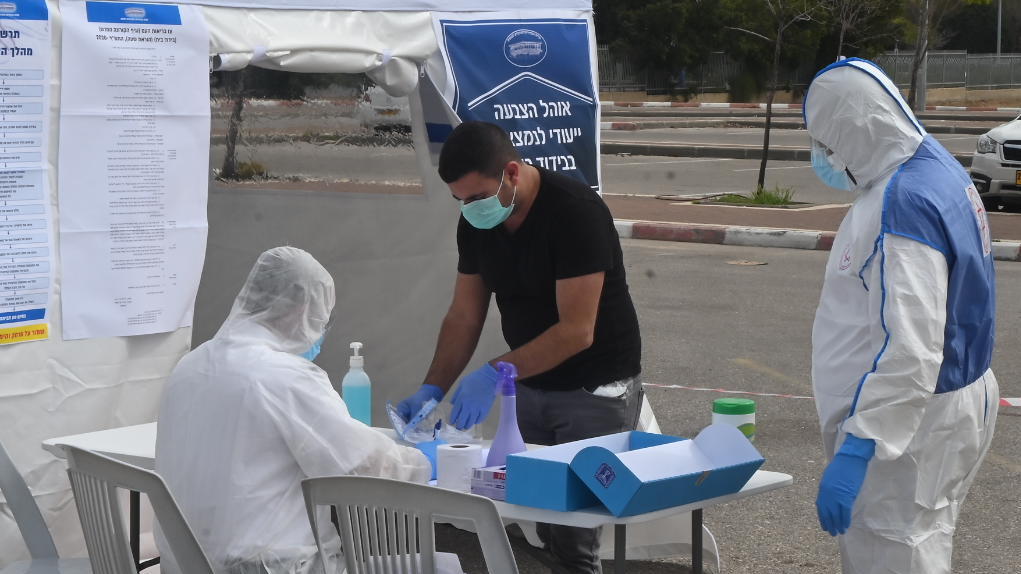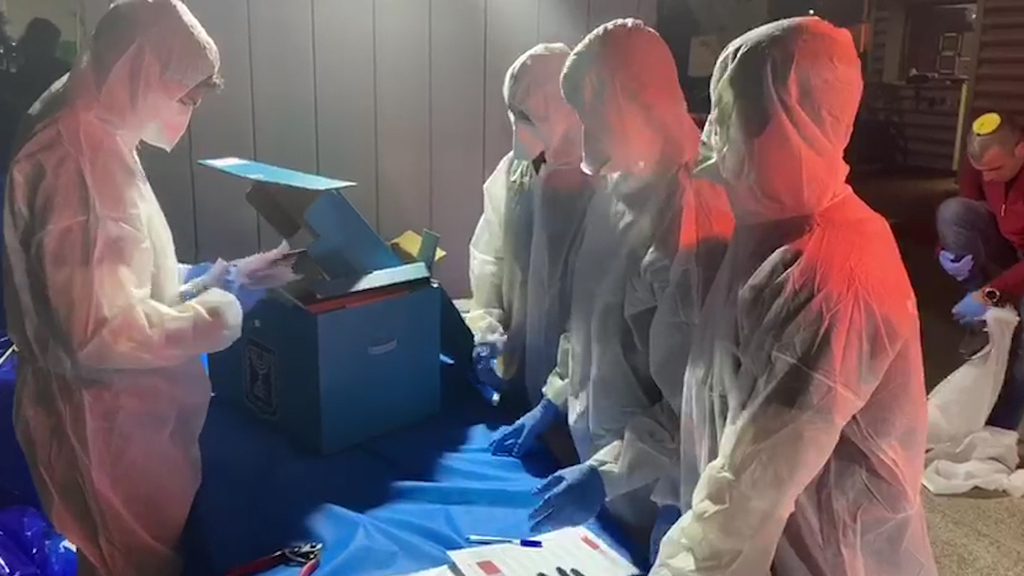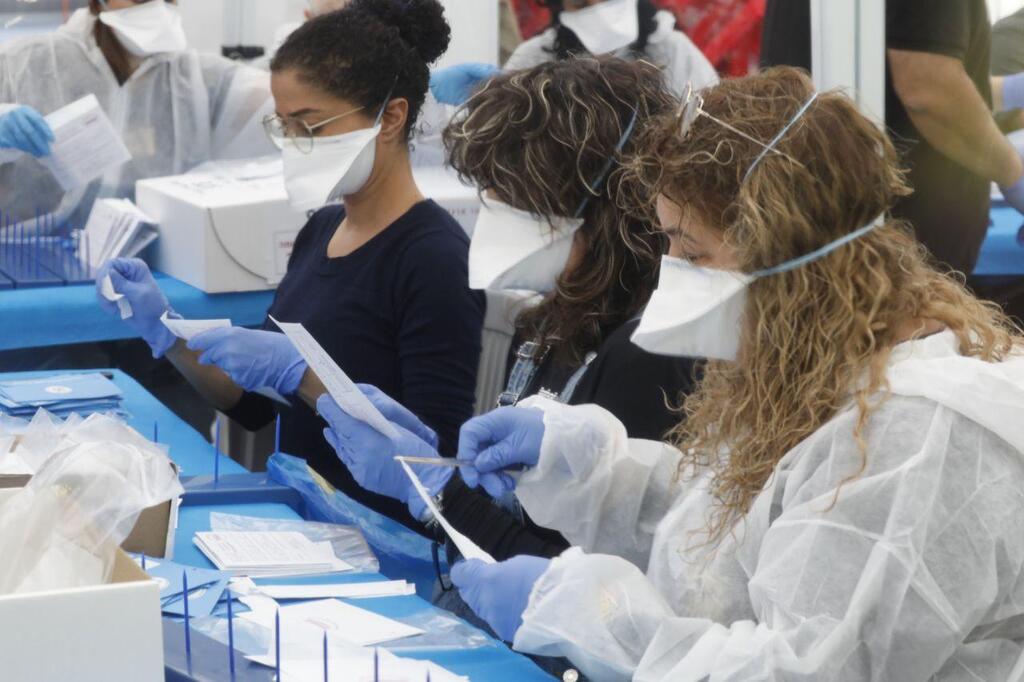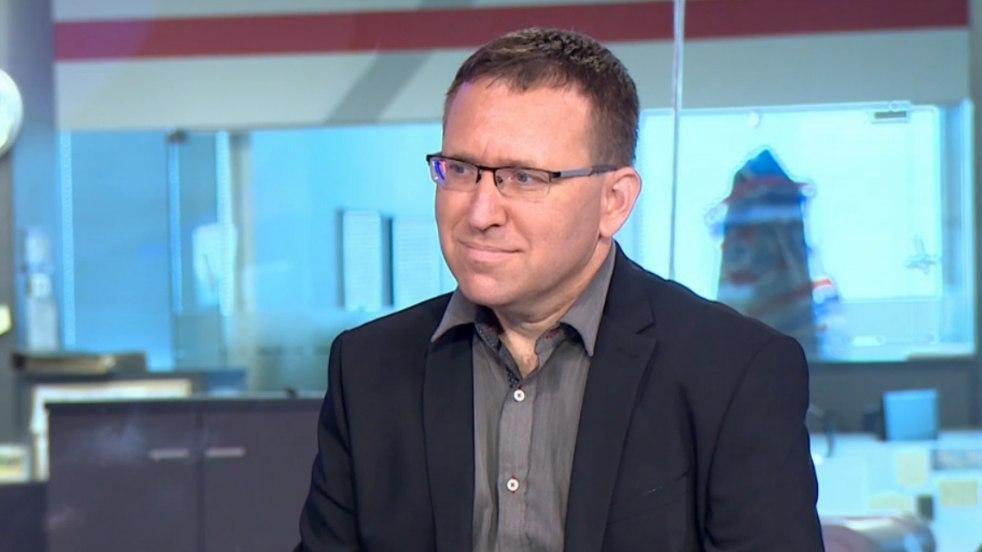While Israelis may feel stuck in an endless time loop as they head into the country's fourth elections in two years, this time Election Day is expected to feel entirely different, under the strains and fears of the coronavirus pandemic.
With more than 380,000 Israelis infected with the virus and over 3,000 deaths since the start of the pandemic, officials are hopeful that the COVID-19 vaccines whose rollout started this week will finally allow the country to put the pandemic behind it. But that will not happen before Israel goes to the polls at the end of March.
4 View gallery


An Israeli in quarantine casts his ballot at a pop-up polling station in Ashkelon in the March 2020 elections
(Photo: Avi Rokah)
On Tuesday, hours before Knesset’s dissolution, the committee in charge of outlining the rules and guidelines for Election Day convened for a marathon session.
With the deadline nearing and tensions running high, lawmakers passed a series of resolutions intended to enable the country to elect the next parliament amid the health crisis.
"There was real friction between health officials and the political side," says Prof. Hagai Levine, a member of the government’s coronavirus task force who attended the crucial meeting.
"On the one hand, the Health Ministry essentially said ‘we’re in charge – it’s a health issue, we’ll make the rules,'" says Levine, an associate professor of epidemiology at the Hebrew University of Jerusalem.
"On the other hand, election committee members explained that this is a democratic issue, that everyone’s right to vote must be upheld and everyone should adapt to make that possible," he says.
In one tense exchange, Dr. Sharon Alroy-Preis, the Health Ministry’s head of Public Health Services, accused the committee of endangering the public.
"You’re talking about tens of thousands of confirmed patients coming out to vote. That poses a grave risk," she warned.
Orly Adas, the director general of the Central Election Commission, said in response that the panel "will do the best we can to prevent infections on Election Day."
4 View gallery


Elections officials in protective gear count ballots from people in coronavirus quarantine for the March 2020 election
(Photo: Central Elections Committee)
Levine says that much of the pressure is a result of the time constraints.
"You can’t change the rules of the game midway through. Knesset had to decide how to conduct these elections before it dissolved itself. You can’t invent new voting methods or protocols after elections were called," he said.
He also believes that "in the best-case scenario, three million people will have been vaccinated by Election Day. In that ideal situation, we’ll be in a much better place, but the virus won’t disappear."
The decisions reached by the committee includes placing designated polling booths in every city and town for infected voters only, and separate booths to be used by those in quarantine.
Approximately 350 nursing homes also will be equipped with their own polling stations, to enable the elderly to vote without coming into contact with the general public.
"We want people to be safe when voting," says Central Election Commission spokesperson Giora Pordes.
"The coronavirus is a huge factor making things unknown. We’re just starting the process to get things in order, figuring out exactly how to do this. We’re working on it and expect to bring a budget for approval in mid-January 2021."
On Tuesday, the commission estimated the cost of protective gear and the addition of thousands of voting stations and poll workers would reach at least NIS 65 million (approx. $20.2 million).
4 View gallery


Central Election Commission workers counting ballots during the March 2020 election
(Photo: Shaul Golan)
Yet officials fear not just Election Day, but also the weeks leading up to it. Warily eyeing the latest United States presidential elections, election commission members will have to decide whether to limit political rallies and other events prior to going to the polls.
"Do you ban those and hurt the democratic process, or allow them and exacerbate infections? It’s a very difficult balancing act of two basic rights," Levine says.
"The most important thing is keeping people safe and taking precautionary measures as much as we possibly can," Pordes insists.
Health officials remain optimistic that with proper preparation and planning, Israel can get through the coming months with minimal damage.
"But that demands professionalism, and unfortunately due to the political side of this, any decision will be affected by political considerations, or at least suspected as such," Levine says.
Article written by Uri Cohen with a contribution from Josh Shuman. Reprinted with permission by The Media Line


